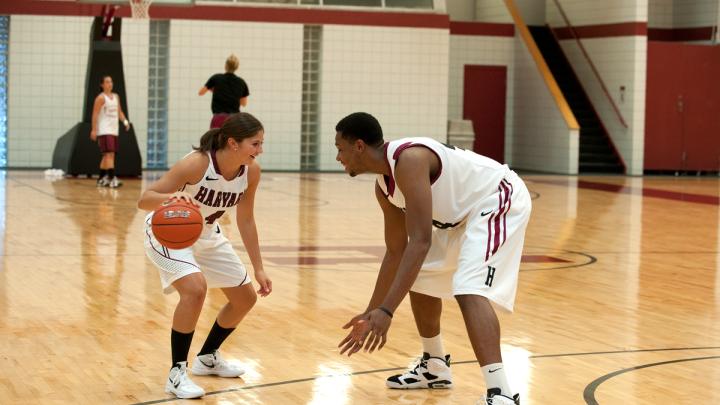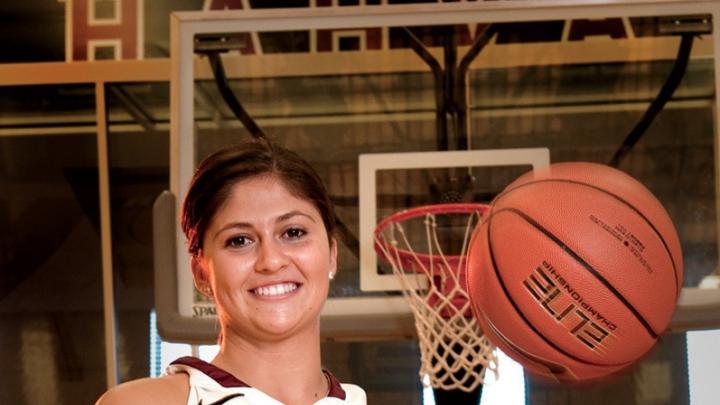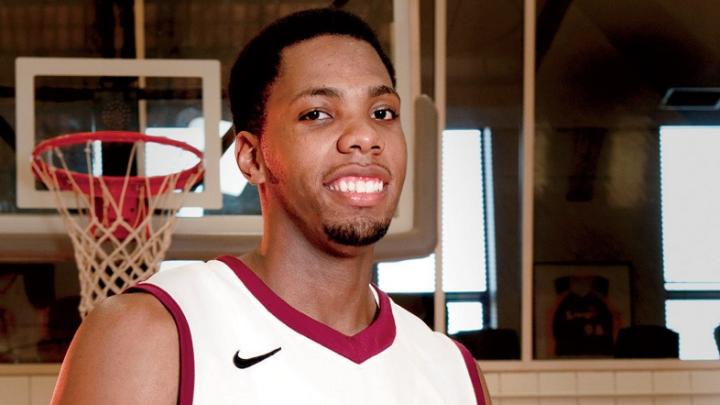Brogan Berry
The point guard—the #1 position—is the quarterback of a basketball team. She’s the floor leader, starting the attack and shouting defensive signals. Much of the team’s success or failure hinges on her performance—and luckily, the Harvard women’s squad is blessed with a quick dynamo of a point guard in Brogan Berry ’12, a woman with a high “court IQ” who knows how to make things happen. “She’s a great facilitator,” says Keith Wright ’12, men’s Ivy League Player of the Year (see opposite). “Brogan is very unselfish, always looking for everyone else. She’s one of those players, like Brandyn [Curry ’13, the men’s starting point guard], who can get wherever she wants to on the court.”
Dishing the ball off is atop Berry’s priority list: “I love passing and getting teammates easy shots,” she says. “My main goal is to get as many assists and as few turnovers as possible. That’s the first stat I look at after a game: the assist/turnover ratio.” She must often have smiled last year in the locker room, as her ratio of 2.25 led the Ivy League and was tenth in the nation. She also led the league in assists per game with 4.6. Berry talks less about her scoring, but in fact she topped the Crimson and was second in the Ivy League, averaging 13.9 points per game (with a .453 field-goal percentage in the Ivies, good for fifth in the league). During a game, she might mentally run a little offense/defense tally with her opponent: “My girl is not going to score more than me.”
The five-foot, eight-inch Berry (“In college, you spend less time in the paint, where there are a lot more trees [tall players]”) has played “thousands of games with different players and coaches” since she took up the sport in third grade. She grew up the youngest of four children—hersister and two brothers were all athletes—in Beavercreek, Ohio. Her father, Rob Berry, was a former semipro baseball player who coached the basketball team at Carroll High School, where the squad made regional finals and Brogan collected MVP awards.
“Nobody liked playing the point guard position,” she recalls, “because it’s a lot of work starting the offense—a lot of responsibility. So I got to play a lot.” Furthermore, her dad’s close involvement taught Berry “to see basketball from a coach’s perspective, so I know the game very well. My brain never stops during play—even on the bench, I’m thinking.”
She’ll be thinking plenty of defense this season, along with her co-captain, Lindsay Louie ’12. Princeton has won the Ivies the last two years, with Harvard coming second both times. Last year the Tigers posted a 13-1 record to the Crimson’s 10-4; while Harvard led the Ivies in offense at 69.2 points per game, about one more than Princeton, the Crimson was seventh in defense, allowing 61.8 points per game, while the Tigers held opponents to a 46.4-point average.
Berry, who aspires to play professionally in Europe after college, has been prepping assiduously in the off-season for that first tipoff. She enjoys friendly pickup games, for example, with football and baseball players. “Playing with guys is tremendous practice,” she explains. “They are faster and more athletic, and they make you work harder.” She smiles. “And it adds one more aspect to the satisfaction if you can beat the guys.”
Keith Wright
Last year was historic: the Harvard men secured their first Ivy League basketball championship, tying Princeton for the conference’s best record at 12-2 by beating both the Tigers and Penn on the final weekend. It was a special year, too, for co-captain and power forward (#4 position) Keith Wright ’12, who was chosen Ivy League Player of the Year. “Keith put in a tremendous amount of work, from his conditioning to his skills, and he’s being rewarded for it,” says the women’s starting point guard, Brogan Berry ’12 (see above). “He is very quick for a big guy, and very powerful. To be chosen Ivy Player of the Year as a junior is a phenomenal achievement.”
Even with all this success, Wright remains hungry. “There was so much excitement on campus—students, professors, dining-hall staff,” he says, recollecting the past season. “Students were upset that they couldn’t get tickets to games. Last year was great, but it still leaves a bad taste—losing by one to Princeton at Yale [in a postseason playoff game to decide the Ivies’ entry to the NCAA tournament]. We feel we have so much more to accomplish.”
There is pressure to do so, because analysts have already declared that this is Harvard’s year to win it all outright. The Crimson graduated no one from last year’s varsity, and Wright returns to co-captain the team again with Oliver McNally ’12. Coach Tommy Amaker has brought some promising freshmen aboard. Yet as Wright declares, “The only people we can control are ourselves. We have to take care of what we need to do.”
The six-foot, eight-inch Wright did plenty on his way to an AP Honorable Mention All-America selection last year. He led Harvard in scoring (14.8 points per game) and rebounding (8.3 per game)— third and second in the Ivies, respectively. His 54 blocked shots were the second-highest total in Crimson history (“I have long arms, so I could always block shots”). He was fifteenth in the nation with a field goal percentage of .584; though he has an outside shot, he does most of his damage down low.
Naturally enough, opponents double-team Wright: for him, one-on-one basketball is largely a thing of the past. The crowds he draws, however, obviously have not kept him from scoring, and what is more, “I get a lot of joy out of passing the ball out of a double-team. It’s a great pleasure to kick the ball out to somebody like Christian [Webster],” the junior guard who was second to Wright with a 13.0 points per game average last year.
Wright grew up in San Francisco and Virginia in a single-parent family after his mother and father divorced when he was in second grade. His mother, Sabrena Tabron, played basketball in high school and at San Francisco State College, and Wright wears her number, 44. As a young kid, he was “pretty much a nerd—I was mostly into reading and music,” he says. But the basketball coach at Princess Anne High School in Virginia Beach liked his size, and in his sophomore year pulled him out of class and into the gym. The next year Wright was a varsity starter, doing everything, including bringing the ball up the court and “shooting threes—something the fans at Harvard don’t see me do, ever,” he says, grinning. He transferred to Norfolk Collegiate and was player of the year in its independent-schools conference.
At Harvard, mononucleosis freshman year and an Achilles tendon injury the next season slowed Wright’s start, but he did get to enjoy the memorable senior campaign of teammate Jeremy Lin ’10 (see “Hoops Houdini,” March-April 2009, page 54), whom Wright describes as “a spectacular player and a spectacular human being. Jeremy has a phenomenal work ethic, something I try to mirror.” (Lin currently plays for the NBA’s Golden State Warriors.) That season Harvard made waves by posting its first win over a nationally ranked opponent, an 82-70 thrashing of Boston College. “Winning that game solidified us as a legitimate basketball team,” Wright says.
After college, he would love to play professional ball; a psychology concentrator, he’s also interested in sports psychology and relationship counseling. “I don’t know what vibe I give off, but people want to tell me about their relationships with their girlfriends or boyfriends,” he says, smiling. He has also joined his friend Devin Saxon ’12 of the football team to record some rap numbers that hoops teammate Andrew Van Nest ’12 has featured on his music blog, Nesty’s Eggs. A big Harry Potter fan, Wright was sad to see the Potter movie series come to an end this past summer. It’s not surprising, though, that he could identify with Harry: on the court, he’s something of a wizard himself.











